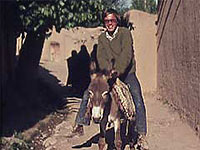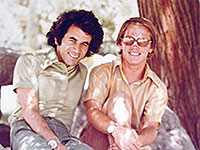"Do you remember picking grapes in my father's orchard and playing in my family's yard?" When Bob Ericksen read these words in an e-mail he received through NAFSA's Conference Connection online scheduling tool in 2009 he knew that "there was only one person in the world that could have sent me that message."
At that time, Ericksen was the director of the Dashew Center for International Students and Scholars at the University of California-Los Angeles (UCLA) and was in his last year as a member of NAFSA's Board of Directors. As he recalls, he was excited for the annual conference to come to Los Angeles over Memorial Day weekend when, less than a week before the event, he received this unexpected communication.
But the name on the e-mail was different from the one he remembered, and the person he remembered was presumed killed more than 20 years before. Ericksen was about to embark on an odyssey of rediscovery.
Illinois Meets Iran

Bob learning to ride a donkey down a narrow lane.
Ericksen graduated in 1973 from Augustana College in Rock Island, Illinois. Looking to head overseas, he applied to the Peace Corps. "I was young, naive, and certainly angered about the United States being engaged in a war half-way around the world. Perhaps part of my naiveté was a belief that by leaving the United States, I might find a place and people more consistent with my values." When he learned he would be going to Iran, he ran to the nearest library to read up on a country he knew nothing about.
Ericksen was placed in the town of Bojnurd, in the northeast corner of Iran, and he served for two years as an English teacher at a high school. "What I did find in Iran was a place and people who welcomed and embraced me, but I soon discovered that issues of peace and social injustice are faced by all nations and cultures. I came away looking back after two years with a better appreciation of the United States and also of what Iran had to offer." One of the best things Iran had to offer was his friend Ali.
Ali, whose real name is being withheld for safety concerns, graduated from Ferdowsi University in 1972 with an English degree. At that time, Iran had mandatory military service, and because Ali had a bachelor's degree, he was sent to work at the Ministry of Education. Following teacher training, Ali sat for a test to determine his placement. "Because my marks were so high, I was the first to choose, and I chose my home town: Bojnurd."
"It wasn't too long after I arrived that the folks who sought out native English speakers came out from here and there," says Ericksen. "Ali was a fellow English teacher with extraordinary fluency in English." Ali remembers it differently. "My English was no good at the time, so I needed a lot of help, and sure enough, there he was. I just saw him one day in the high school where I was assigned to teach."

Bob and Ali in Bojnord, Iran.
They do, however, agree that their connection was strong. "We hit it off well, I got to know him. I got to know his family," remembers Ericksen. "It was such a pleasure to meet someone who spoke the language. We were both fresh from college and university, and being the same age and in the same field, our friendship really grew," says Ali.
Ericksen and Ali spent hours together every afternoon, strolling through town with no particular place in mind and chatting with people along the way. "He helped integrate me into the social fabric of the town," says Ericksen. The two would often spend time in Ali's family orchard or at his family's home when not teaching or traveling.
For a year and half, Ericksen and Ali were inseparable. In the summer of 1975, Ericksen finished his service and returned to the United States to attend the School for International Training (SIT) in Brattleboro, Vermont. The two kept in touch through letters, and eventually, Ali decided to apply to SIT as well. He was admitted into the program in 1976, but by then, Ericksen was no longer in Vermont. The two kept in touch through phone calls and letters when they could, but hectic schedules made it difficult. "We were both busy and going in different directions in our lives," says Ericksen.
